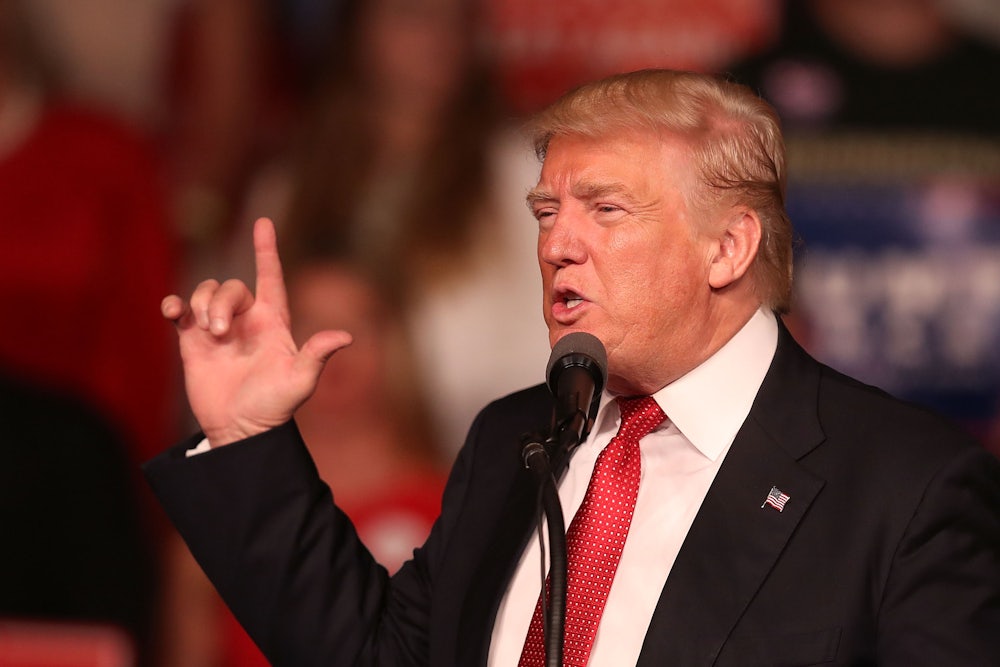Donald Trump gets strangely giddy after terrorist attacks. More than once, they’ve been occasions for him to engage in self-praise, since he believes such events vindicate his dark view of the world. He also sees them as an opportunity to sell himself as the only savior in a time of crisis.
After the the bombing spree in the New York area over the weekend, he phoned Fox and Friends to announce, “I should be a newscaster because I called it before the news. What I said was exactly correct and everybody says while he was right, he called it too soon.” This I-told-you-so response is the exact same one he took in a tweet just hours after the news of the Orlando nightclub massacre broke, “Appreciate the congrats for being right on radical Islamic terrorism, I don’t want congrats, I want toughness & vigilance.” And on May 22, after the suicide bombings in Brussels that killed 32, Trump tweeted, “I have proven to be far more correct about terrorism than anybody- and it’s not even close.”
Trump’s response to these attacks is worth careful scrutiny because he’s never held public office, and thus there’s no extensive record of his handling of such events. It’s a rare chance to see how he would react to the type of unexpected emergency that every president is forced to confront.
What’s striking is the degree to which Trump wholeheartedly embraces a politics of fear. This is not wholly unprecedented. While George W. Bush did issue some statesmanlike words after 9/11 to calm the public and blunt anti-Muslim anger, it’s also the case that the Bush administration manipulated the fear of terrorism to consolidate public support for policies like the Iraq war. Throughout the Bush years, color-coded alerts warning of terrorist attacks were especially frequent right before elections, almost as if they were being used to remind the public that the Republicans were the party of national security (indeed, former Secretary of Homeland Security Tom Ridge wrote in 2011 that he was pressured to raise the alert on the eve of the 2004 election). After Bush left office, the Republicans have more passionately wrapped themselves around fear-based politics, with the 2014 midterms being one long scream of warning about ISIS terrorists and Ebola patients overrunning America.
By contrast, Democrats like Barack Obama and Hillary Clinton have seen it as their responsibility to be calming voices during a crisis, urging the public to be vigilant but to avoid hysteria. In hyper-partisan America, these conflicting responses have resonated with very different electoral factions. According to one recent poll, 29 percent of Clinton supporters fear they will be the victim of a terrorist attack, compared to 68 percent for Trump supporters. While Trump’s strategy of riling up anxiety and panic might not work for the nation as a whole, it certainly appeals to his supporters, and likely deepens their bond to him.
On Fox and Friends, Trump painted a sinister picture of Muslim-Americans as being “a cancer from within”:
They’re here. And I’ve been saying, this is going to be like the Trojan horse. We’re letting tens of thousands of people flow into this country and they are bringing in, in many cases, this is cancer from within. This is something that’s going to be so tough and you know they stay together, so nobody really knows who it is, what’s happening. They are plotting. They keep plotting, and this has been going on for so long and everybody knows it.
These are among the most terrifying words Trump has ever uttered. If you take them as true, then America is facing a sinister internal menace. But if you reject Trump’s view, then you have to confront the fact that the Republican Party is now headed by a truly dangerous demagogue who uses scare tactics to stir up fear and hatred in a way that recalls the worst moments of American history.
